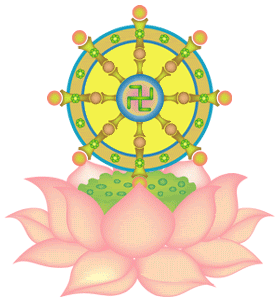Trang nhất » Tin Tức » ENGLISH
Note on Dhammsangani
Chủ nhật - 15/10/2017 12:59The Abhidhamma Pitaka consists of seven treatises—namely, Dhammasangani,Vibhanga,Dhatukatha, Puggalapannatti Kathavatthu, Yamaka and Patthana.
Dhammasangani is the title given to the first book of the Abhidhamma Pitaka. The Pali word dhamma varies in meaning according to context; here as part of the term dhammasangani, ‘dhamma’ means ‘ultimate realities’. ‘Sangani’ means ‘collecting together’ or ‘complete enumeration’. Thus Dhammasangani deals with collecting and enumerating the ultimate realities by the method of triads (tikas) and dyads (duka) as set out in its Matika. For instance, in such a phrase as 'kusala dhamma' or 'akusala dhamma', or abyakata dhamma' which occurs in the Dhammasangani, the word dhamma means ultimate realities.
The Dhammasangani begins with the Matika which is a list of subjects for analytical treatment in the text and grouped in triads and dyads. There are twenty-two ways of grouping the dhamma (ultimate realities) into triads (tikas) and a hundred ways of grouping it into dyads (dukas). Each triad consists of three categories which are related in some way and each dyad consists of two categories which also are related in some way.
Examples of triads:
(a) Kusala Tika
i. Dhammas that are meritorious, kusala dhamma.
ii. Dhammas that are demeritorious, akusala dhamma.
iii. Dhammas that are neither meritorious nor demeritorious, abyakata dhamma.
(b) Vedana Tika
i. Dhammas that is associated with pleasant sensation, sukhaya vedanaya sampayutta dhamma.
ii. Dhammas that is associated with unpleasant sensation, dukkhaya vedanaya sampayutta dhamma.
iii. Dhammas that is associated with sensation which is neither pleasant nor unpleasant, adukkha masukhaya vedanaya sampayutta dhamma.
(c) Vipaka Tika
i. Dhammas that are resultants, vipaka dhamma.
ii. Dhammas that produce resultants, vipaka dhamma dhamma.
iii. Dhammas that are neither resultants nor resultants producing, nevavipaka na-vipaka dhamma dhamma.
An example of dyads:
Hetu Duka
i. Dhammas that are root causes of phenomena, hetu dhamma.
ii. Dhammas that are not root causes, na hetu dhamma
The Dhammasangani is divided into four divisions:
i. Cittupada Kanda, Division on Mind and Mental Concomitants. This division may be regarded as Book I of Dhammasangani.
ii. Rupa Kanda, Division Concerning Corporeality. This division may be regarded as Book II of Dhammasangani.
iii. Nikkhepa Kanda, Division of Summarised Analytical Statements about all the tikas and the dukas without elaborate treatment. This division may be regarded as Book III of Dhammasangani.
iv. Atthakatha Kanda is a very short division but it is very important because it contains additional explanation of certain terms, by means of enumeration. This division may be regarded as Book IV of Dhammasangani.
The first two of these four divisions, namely, Cittuppada Kanda and Rupa Kanda, provide a full analysis of the first tika, namely, the Kusala Tika dealing with Kusala, Akusala and Abyakata Dhamma. They also serve as a basis for the analysis of the dhamma in the other tikas as well as the dukas.
Những tin mới hơn
Những tin cũ hơn
•Tin Được Quan Tâm Nhiều
-
 Nhóm Thiện Nguyện Tịnh xá Ngọc Sơn ủng hộ từ thiện nhân mùa Phật Đản tại Ấn Độ.
Nhóm Thiện Nguyện Tịnh xá Ngọc Sơn ủng hộ từ thiện nhân mùa Phật Đản tại Ấn Độ.
Bố thí là nền tảng cơ bản để kết nối yêu thương, sẻ chia cuộc sống nhằm làm vơi bớt nỗi đau bất hạnh... -
 KHÓA TU MỘT NGÀY CHÁNH NIỆM NIỆM PHẬT TẠI TỊNH XÁ NGỌC SƠN.
KHÓA TU MỘT NGÀY CHÁNH NIỆM NIỆM PHẬT TẠI TỊNH XÁ NGỌC SƠN.
Vào lúc 8 giờ sáng ngày 21/10/2017 (nhằm ngày 2/9/ Đinh Dậu), khóa tu một ngày Chánh Niệm Niệm Phật... -
 Bữa cơm chuyển nghiệp lần 5
Bữa cơm chuyển nghiệp lần 5
Sáng ngày 12/10/2017 ( Nhằm ngày 23/8/ Đinh Dậu), chư tăng và Phật tử Tịnh xá Ngọc Sơn đã thân lâm... -
 Phát quà trung thu và trao học bổng cho các cháu thiếu nhi
Phát quà trung thu và trao học bổng cho các cháu thiếu nhi
Tết Trung thu là một trong những lễ hội truyền thống có ý nghĩa quan trọng trong đời sống văn hóa... -
 Chương trình đón mừng đại lễ Phật Đản PL. 2560 tại Tịnh xá Ngọc Sơn
Chương trình đón mừng đại lễ Phật Đản PL. 2560 tại Tịnh xá Ngọc Sơn
Vào lúc 18 giờ ngày 14/4/ Bính Thân, dưới sự chứng minh của TT. Giác Trí cùng chư tôn Đức Tăng, Ni,... -
 Đại lễ Khánh thành bảo tháp Xá lợi Phật - Tịnh xá Ngọc Sơn
Đại lễ Khánh thành bảo tháp Xá lợi Phật - Tịnh xá Ngọc Sơn
Sáng ngày 7.4.2016 (01.3. Bính Thân) Tịnh xá Ngọc Sơn, xã Phước Sơn, huyện Tuy Phước, tỉnh Bình Định... -
 Công trình Bảo tháp xá-lợi ở TX. Ngọc Sơn
Công trình Bảo tháp xá-lợi ở TX. Ngọc Sơn
Nhằm tạo điều kiện cho mọi người không đủ phước duyên đến các nước để chiêm bái xá-lợi, Thượng tọa... -
 Lễ khánh thành bảo tháp thờ xá lợi Phật tại Tịnh xá Ngọc Sơn
Lễ khánh thành bảo tháp thờ xá lợi Phật tại Tịnh xá Ngọc Sơn
Ngày 7/4/1016 (nhằm ngày 01/3 năm Bính Thân), PL. 2559 tại Tịnh xá Ngọc Sơn, xã Phước Sơn, huyện Tuy...
•Tập San Đuốc Sen
-
 Nhóm Thiện Nguyện Tịnh xá Ngọc Sơn ủng hộ từ thiện nhân mùa Phật Đản tại Ấn Độ.
Nhóm Thiện Nguyện Tịnh xá Ngọc Sơn ủng hộ từ thiện nhân mùa Phật Đản tại Ấn Độ.
Bố thí là nền tảng cơ bản để kết nối yêu thương, sẻ chia cuộc sống nhằm làm vơi bớt nỗi đau bất hạnh... -
 KHÓA TU MỘT NGÀY CHÁNH NIỆM NIỆM PHẬT TẠI TỊNH XÁ NGỌC SƠN.
KHÓA TU MỘT NGÀY CHÁNH NIỆM NIỆM PHẬT TẠI TỊNH XÁ NGỌC SƠN.
Vào lúc 8 giờ sáng ngày 21/10/2017 (nhằm ngày 2/9/ Đinh Dậu), khóa tu một ngày Chánh Niệm Niệm Phật... -
 Bữa cơm chuyển nghiệp lần 5
Bữa cơm chuyển nghiệp lần 5
Sáng ngày 12/10/2017 ( Nhằm ngày 23/8/ Đinh Dậu), chư tăng và Phật tử Tịnh xá Ngọc Sơn đã thân lâm... -
 Phát quà trung thu và trao học bổng cho các cháu thiếu nhi
Phát quà trung thu và trao học bổng cho các cháu thiếu nhi
Tết Trung thu là một trong những lễ hội truyền thống có ý nghĩa quan trọng trong đời sống văn hóa... -
 Chương trình đón mừng đại lễ Phật Đản PL. 2560 tại Tịnh xá Ngọc Sơn
Chương trình đón mừng đại lễ Phật Đản PL. 2560 tại Tịnh xá Ngọc Sơn
Vào lúc 18 giờ ngày 14/4/ Bính Thân, dưới sự chứng minh của TT. Giác Trí cùng chư tôn Đức Tăng, Ni,... -
 Đại lễ Khánh thành bảo tháp Xá lợi Phật - Tịnh xá Ngọc Sơn
Đại lễ Khánh thành bảo tháp Xá lợi Phật - Tịnh xá Ngọc Sơn
Sáng ngày 7.4.2016 (01.3. Bính Thân) Tịnh xá Ngọc Sơn, xã Phước Sơn, huyện Tuy Phước, tỉnh Bình Định... -
 Công trình Bảo tháp xá-lợi ở TX. Ngọc Sơn
Công trình Bảo tháp xá-lợi ở TX. Ngọc Sơn
Nhằm tạo điều kiện cho mọi người không đủ phước duyên đến các nước để chiêm bái xá-lợi, Thượng tọa...
•Chia Sẻ Cùng Bạn Đọc
-
 Văn cảm tưởng về Thầy nhân mùa Vu Lan Báo Hiếu
Văn cảm tưởng về Thầy nhân mùa Vu Lan Báo Hiếu
Hôm nay nhân mùa Vu lan báo hiếu, Thầy cho chúng con được dâng lên lời cảm niệm này, thành kính cúng... -
 CLB Tình nguyện Sen Hồng sinh hoạt buổi đầu tiên
CLB Tình nguyện Sen Hồng sinh hoạt buổi đầu tiên
Ngày 17/4/2016, dưới sự chứng minh của HT. Giác Pháp - Chủ nhiệm Câu lạc bộ Tình nguyện Sen Hồng,... -
 Ông Bụt của tôi
Ông Bụt của tôi
-
 Giá trị của công việc
Giá trị của công việc
Một chàng trai trẻ vừa tốt nghiệp Đại học loại xuất sắc nộp đơn dự tuyển vào vị trí quản lý cấp thấp... -
 Giá trị của cuộc sống
Giá trị của cuộc sống
Cuộc sống luôn 'nói chuyện' với ta qua những điều giản dị và không ngờ đến nhất.
•Hình Ảnh Tịnh Xá Ngọc Sơn
 |
 |

 Xem phản hồi
Xem phản hồi Gửi phản hồi
Gửi phản hồi






